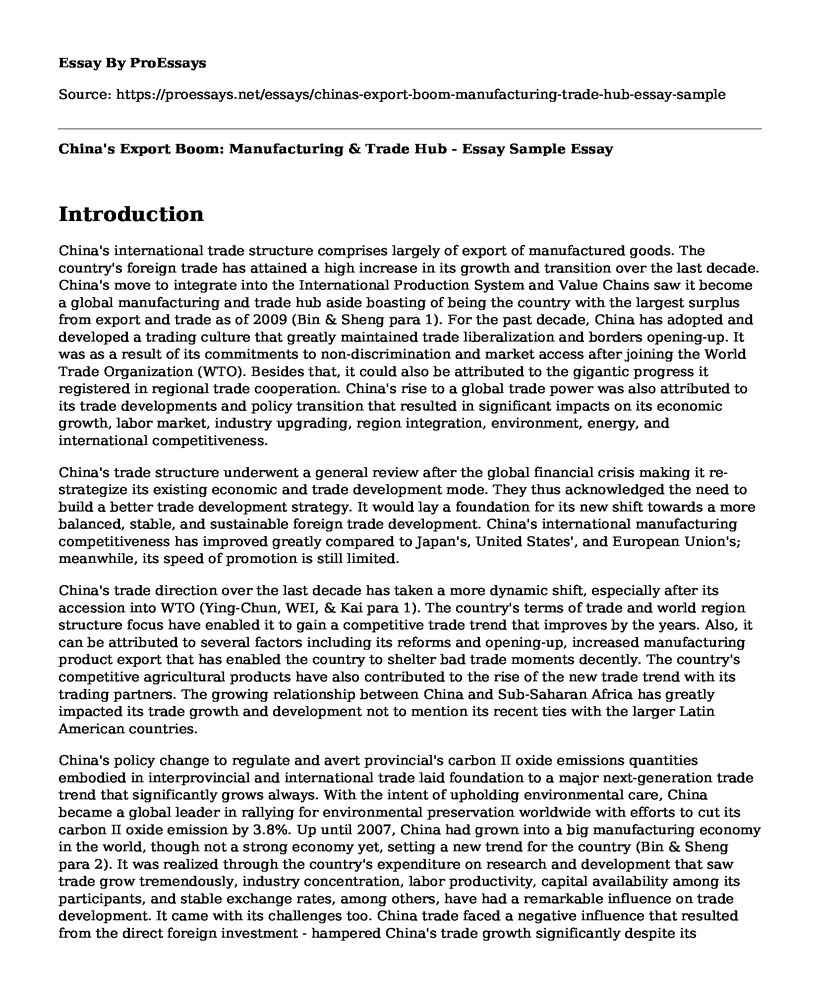Introduction
China's international trade structure comprises largely of export of manufactured goods. The country's foreign trade has attained a high increase in its growth and transition over the last decade. China's move to integrate into the International Production System and Value Chains saw it become a global manufacturing and trade hub aside boasting of being the country with the largest surplus from export and trade as of 2009 (Bin & Sheng para 1). For the past decade, China has adopted and developed a trading culture that greatly maintained trade liberalization and borders opening-up. It was as a result of its commitments to non-discrimination and market access after joining the World Trade Organization (WTO). Besides that, it could also be attributed to the gigantic progress it registered in regional trade cooperation. China's rise to a global trade power was also attributed to its trade developments and policy transition that resulted in significant impacts on its economic growth, labor market, industry upgrading, region integration, environment, energy, and international competitiveness.
China's trade structure underwent a general review after the global financial crisis making it re-strategize its existing economic and trade development mode. They thus acknowledged the need to build a better trade development strategy. It would lay a foundation for its new shift towards a more balanced, stable, and sustainable foreign trade development. China's international manufacturing competitiveness has improved greatly compared to Japan's, United States', and European Union's; meanwhile, its speed of promotion is still limited.
China's trade direction over the last decade has taken a more dynamic shift, especially after its accession into WTO (Ying-Chun, WEI, & Kai para 1). The country's terms of trade and world region structure focus have enabled it to gain a competitive trade trend that improves by the years. Also, it can be attributed to several factors including its reforms and opening-up, increased manufacturing product export that has enabled the country to shelter bad trade moments decently. The country's competitive agricultural products have also contributed to the rise of the new trade trend with its trading partners. The growing relationship between China and Sub-Saharan Africa has greatly impacted its trade growth and development not to mention its recent ties with the larger Latin American countries.
China's policy change to regulate and avert provincial's carbon II oxide emissions quantities embodied in interprovincial and international trade laid foundation to a major next-generation trade trend that significantly grows always. With the intent of upholding environmental care, China became a global leader in rallying for environmental preservation worldwide with efforts to cut its carbon II oxide emission by 3.8%. Up until 2007, China had grown into a big manufacturing economy in the world, though not a strong economy yet, setting a new trend for the country (Bin & Sheng para 2). It was realized through the country's expenditure on research and development that saw trade grow tremendously, industry concentration, labor productivity, capital availability among its participants, and stable exchange rates, among others, have had a remarkable influence on trade development. It came with its challenges too. China trade faced a negative influence that resulted from the direct foreign investment - hampered China's trade growth significantly despite its tremendous success in the trade as a country.
Works Cited
Ying-chun, WEI, and LI Kai. "; Empirical Analysis on Developing Trend And Determinants Of International Competitiveness In China Manufacturing." Chinese Journal, vol 03, 2010. Full-Text Database, Accessed 15 Dec 2019. (Ying-Chun, and Kai) http://en.cnki.com.cn/Article_en/CJFDTOTAL-CMJJ200703001.htm
Bin, Sheng. "China's Transition After Its Accession To The WTO: Review And Prospect Of China's Trade Development." Chinese Journal, 2011. Full-Text Database, Accessed May 2011. (Bin) https://openknowledge.worldbank.org/bitstream/handle/10986/6336/WPS4799.pdf?sequence=1
Cite this page
China's Export Boom: Manufacturing & Trade Hub - Essay Sample. (2023, Mar 20). Retrieved from https://proessays.net/essays/chinas-export-boom-manufacturing-trade-hub-essay-sample
If you are the original author of this essay and no longer wish to have it published on the ProEssays website, please click below to request its removal:
- The Constitution, The Bill Of Rights, And The Amendments
- The US Constitution V. Texas Constitution Essay Example
- Power of Governors in Public Policy - Research Paper
- U.S. Drug Control Policy: Slowly Learning the Hard Way & Its Implications for Mexico - Annotated Bibliography
- Essay Sample on Free Enterprise System: US Market Policies & Systems
- Essay on Intergovernmental Management: Improving Living Standards in the 21st Century
- A Guide to Understanding Omnibus Bills - Essay Sample







